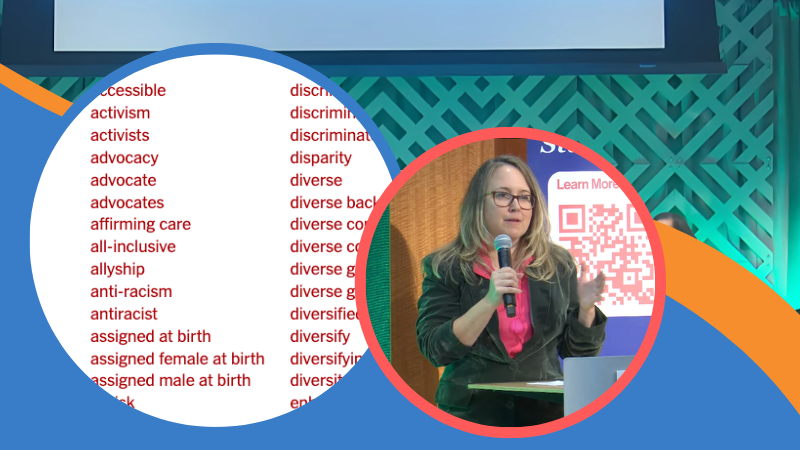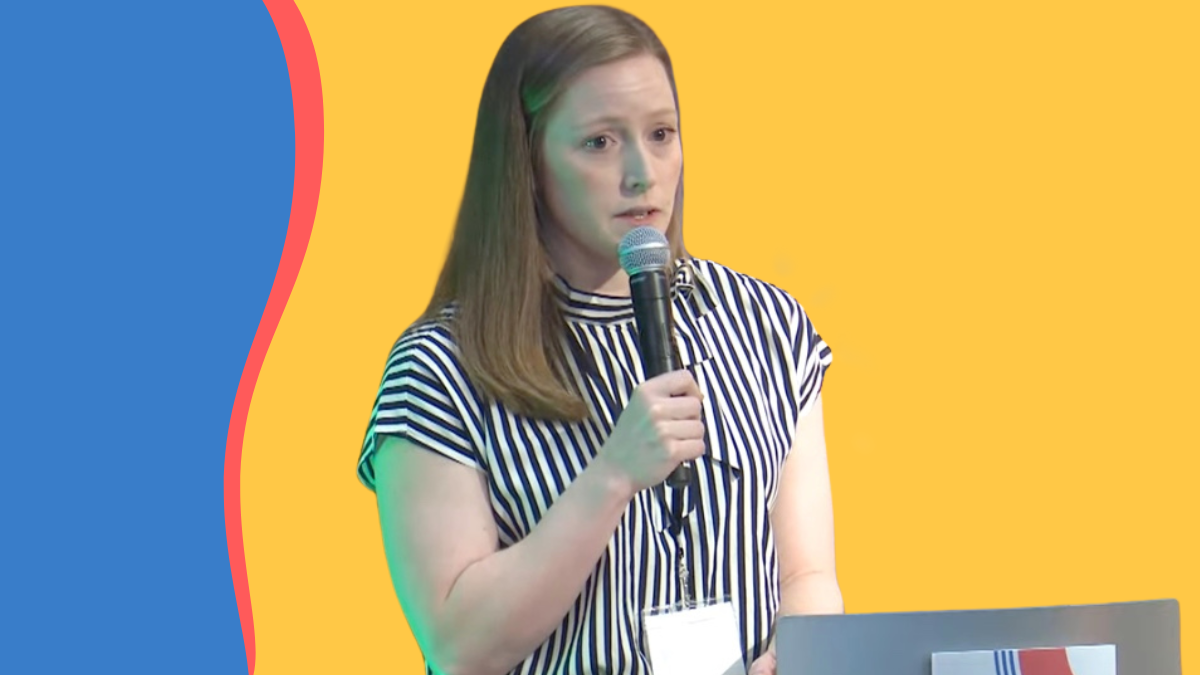Arielle’s experience seeking help for maternal mental health challenges, which she bravely shared at the 2025 FORUM, illustrates how those who share their symptoms with providers are met with the following:
- Are often told, “I only focus on medical issues.”
- Are brushed off as having “new mommy blues”
- Receive no help even after expressing suicidal thoughts
Read Arielle’s full story below and learn what the Policy Center is doing to support providers in addressing maternal mental health so mothers like Arielle no longer fall through the cracks.
“Late in his life, my grandfather wrote down his life story. It begins with this sentence: “My mother was sick after my birth, and it was Aunt Angie who was in charge of taking care of me.” Was my great-grandmother recovering from a complicated birth or an infection? Is it possible she was experiencing postpartum depression and couldn’t care for her newborn son? We only have this one sentence; the details of her experience are lost to history. I’m grateful to be in the company of women who are talking about postpartum depression and refusing to hide their stories.
During my pregnancy, I sometimes felt anxious and alone, especially when I experienced nausea and anemia. While in the hospital to give birth, I encountered some wonderful, supportive nurses and some staff who didn’t add to the experience. Still, I wouldn’t be talking with you today if pregnancy and childbirth were the hardest times for me.
The first weeks of my daughter’s life felt endless. Breastfeeding didn’t come easily, the baby only slept for two hours at any time, and my husband and I didn’t have family locally. I felt nervous and on edge.
When I look back at her earliest days, there were three instances where I reached out for help, but instead of getting connected to care and support, I fell through cracks in the system.
First: A health coach from my health insurance called. I confessed that I felt unstable and needed help; she responded that her focus was my physical health, not my mental health. My information was sent to a mental health coach, but I missed her phone calls while taking care of the baby, and she didn’t pick up when I called back. Eventually, she stopped calling. Missed opportunity number one.
Then, when my husband had to return to work at 6 weeks postpartum, I became my daughter’s primary caregiver. I felt lost trying to care for her and play with her, and I only relaxed when my daughter took long afternoon naps. I started to believe that these sleepless nights, long days, and bad feelings would never end. At my OB postpartum visit, I was given, and completed the Edinburgh Postnatal Depression scale. After reviewing my responses, the nurse midwife remarked, “So, new mommy blues?” and moved on to the next part of the appointment. Her remark kept me second-guessing my own feelings and whether I should ask for help. Missed opportunity number two.
Finally, one of my lowest moments occurred on Valentine’s Day. I watched my husband play with our daughter and thought to myself, “It would be better for them if I wasn’t here anymore.” By Valentine’s Day, I had taken my daughter to her pediatrician seven times in her life. At those visits, I’d once again completed the Edinburgh Postpartum Scale. To my surprise, the survey was never mentioned by the pediatrician. After filling it out several times, I started refusing it. Missed opportunity number three.
I had health insurance, a stable home, access to doctors, and paid maternity leave – and I still fell through holes in our systems. If obstetric providers and pediatricians are going to offer the Edinburgh Postnatal Depression Scale, they need to review the responses with new moms and explain what the score means, as well as next steps. This also means allocating time for someone in the office to meet with the moms and track the record for follow-up. If an insurer has a health coach talk to a new mom, they are especially in a position to help her access services and provide a warm handoff to the right provider. Finally, providers must appreciate the significance and prevalence of postpartum depression. The dismissive comment I received is particularly concerning because it happened at a federally qualified health center. These centers often serve patients from vulnerable communities and should be more, not less, attuned to postpartum depression.
I would normally wrap this up by assuring you that I’m better and received the help I needed. I am better, but that doesn’t mean our systems are fixed. I recovered with the help of my family, medication, and a doctor who took her own initiative to reach out to me. Our systems are not designed to identify, refer, and treat postpartum depression, and until we demand change, new mothers will continue to fall through the cracks.”
To address these challenges, the Policy Center is:
- Training healthcare providers through our quarterly Maternal Mental Health 101 webinars and Maternal Mental Health online training course, hosted in partnership with Postpartum Support International.
- Piloting embedding community health workers (CHWs) in Ob/Gyn clinics, to expand provider capacity to screen, treat, and support maternal mental health. CHWs will assist with screening, provide brief intervention, collaborate with providers on treatment planning, social determinants of health supports, and camaraderie. The planning phase of this pilot began in 2024, with implementation beginning later this year.
- Pushing for private insurers and Medicaid to provide adequate reimbursement of Obstetric providers (including unbundling obstetric care) for screening and treatment of all maternal health conditions, including maternal mental health disorders.
- Urging health insurers to include maternal mental health in maternity care management services in pregnancy and through the full year postpartum, through our Insurer Whole Mom Standards. Why? Coordinating care is complicated, and obstetric providers, and especially patients who are suffering from these disorders (not to mention healing from delivery and caring for newborns), are not positioned to navigate the complexities of finding mental health providers who specialize in MMH care who are in network with insurers. Insurer care coordinators engage with patients routinely and can also coordinate with the obstetric provider when barriers or changes in the patient’s treatment and intervention preferences arise.
We are working toward a future where all women are routinely screened by their obstetric providers and receive timely, compassionate care.



